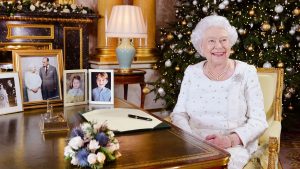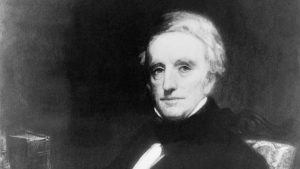Our Christmas Day poetry news roundup looks at the origin of the Queen’s Christmas message, and also the possibility that one of the most famous English language Christmas Poems was in fact not written by the poet it has been attributed to for almost 200 years.
The Queen’s Christmas Day Message
For many families, listening to the Queen’s Christmas Day message on the television plays an important part of their Christmas Day traditions. This year has not been a bad one for the Queen, with several Royal Weddings, a new great-grandchild being born and one on the way, the 70th birthday of Prince Charles and successful surgery for the Duke of Edinburgh in April.
The history of the Royal message dates to the reign of the Queen ‘s grandfather, King George V. In 1932 he delivered the first live broadcast to the nation. What is interesting to note is that the speech was in fact written for the King by the poet and author, Rudyard Kipling.
‘s grandfather, King George V. In 1932 he delivered the first live broadcast to the nation. What is interesting to note is that the speech was in fact written for the King by the poet and author, Rudyard Kipling.
The message which began:

was heard by over 10 million people, and the impact that the speech had so impressed the King that a new tradition was born.
Who knows, if it hadn’t been for the words written by Kipling all those years ago and the impact that the speech had, the tradition may have faltered before it even got off the ground?
Twas The Night Before Christmas And the Mystery Manuscript
 A handwritten manuscript has come to light in the papers of a family named Odell who are from Fredericton in New Brunswick. This manuscript shows several differences to the poem as we know it, especially in terms of the names given to the reindeer and calls into question whether the poem was in fact written by the man it is attributed to.
A handwritten manuscript has come to light in the papers of a family named Odell who are from Fredericton in New Brunswick. This manuscript shows several differences to the poem as we know it, especially in terms of the names given to the reindeer and calls into question whether the poem was in fact written by the man it is attributed to.
Twas the Night before Christmas is possibly one of the best-known English poems about the festive season.
In 1823 under the title A Visit from St. Nicholas the poem was published in the Sentinel of Troy. N.Y anonymously. It is most commonly attributed to the U.S writer and professor Clement Clarke Moore.
The New Brunswick Museum holds a collection of documents from the Odell family, which includes a handwritten copy of the poem watermarked 1824. There are also several letters between Jonathan Odell and Moore.
The handwritten version of the poem in this correspondence contains some differences in the poem, including the names of the reindeer. In the original they are Dunder and Blixem – close to the Dutch for Thunder and lightening, yet we know them as Donner and Blitzen – closer to the German words. In Odell’s copy they are Donder and Blixem. The reindeer name order is also different between the Odell and Moore versions of the poem.
The Odell version is believed to have been written down having been overheard and as Moore denied for many years that the poem was his. This may strengthen the argument of another family that of Henry Livingston Jr that he was the true author of the poem.


You must register to comment. Log in or Register.